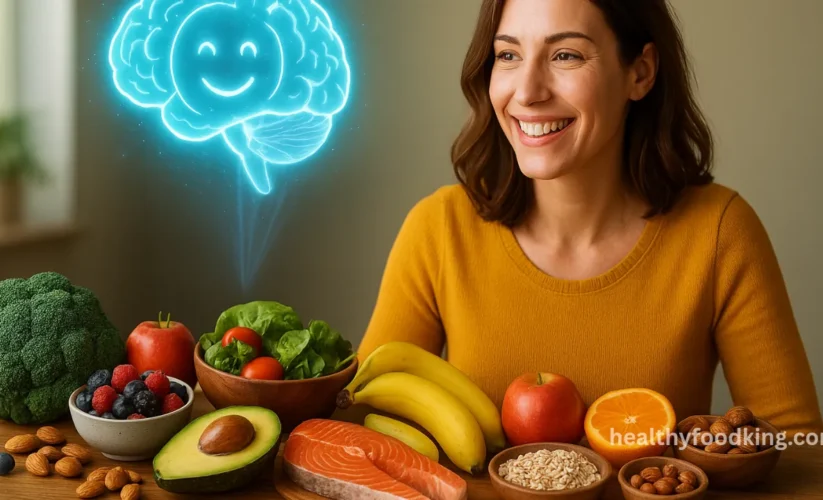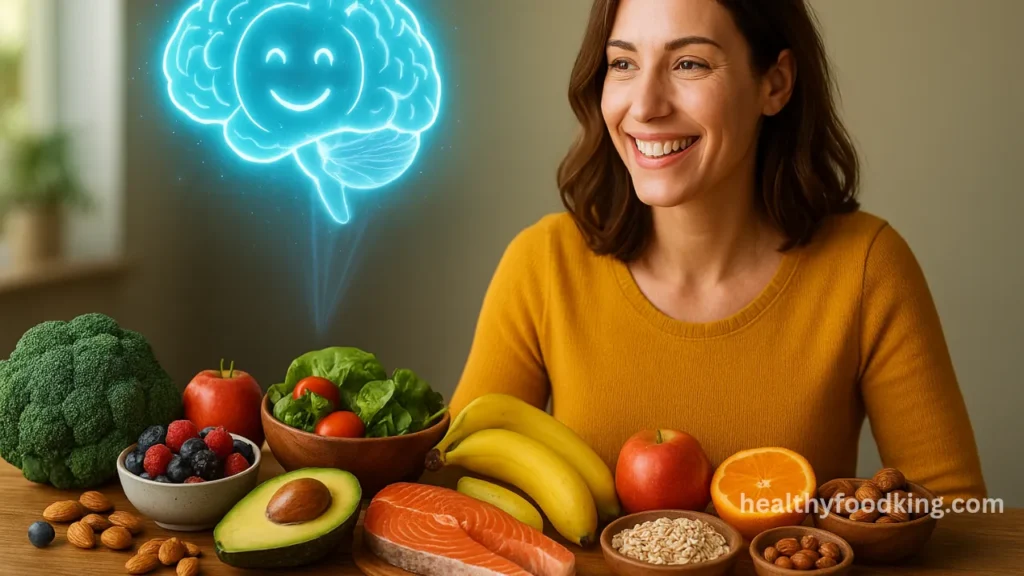
How Do Foods Affect Mood and Emotions?
Food is not only a source of life for us, but it also significantly influences our mood. If you take a moment to consider it, an apparent relationship exists between the food we eat and our feelings. Several specialists posit that a good diet can elevate the feeling of happiness, soothe the mind, and increase the concentration capacity, whereas unhealthy food can make the body feel lethargic, the mood get worse, and stress arise. Let’s explore it. What a huge influence food has on our moods.

Why Does Food Matter for Mood?
Our brains and muscles are a part of our bodies, which are like cars; they need fuel to work well. Food provides our minds with energy, vitamins, minerals, and other nutrients they need every day. Eating healthy foods makes us feel awake and happy. A person who eats too much oily, sugary, or processed food will very quickly become aware that the food will make them feel very bad.
Scientists say that the brain uses vitamins and minerals from food to make neurotransmitters. These substances make us feel good, relaxed, and strong. One of such chemicals is serotonin, and it is the one that gives us a good feeling. Eating healthy and nutritious foods, like fruits, vegetables, and grains, will help the brain to produce more of these “happy chemicals”.
How Sugar and Junk Food Change Feelings
When you feel sad, it is very convenient to go for a bag of chips or a candy bar. But these types of food can raise your energy level very fast, and then also make you feel low again. This “sugar crash” can bring along being angry, tired, or feeling uneasy. A great number of specialists assure that overconsumption of sugar is a factor that very much influences how stressed we become. Instead of supporting, junk food can deteriorate mood swings to the extent that you feel depressed for a long time.
In the long run, snacks like fresh fruits, yogurt, nuts, or seeds can keep you energised and help your mood stay stable. Foods rich in fiber and protein take quite a long time to digest, which is why you remain full, calm, and glad for a long time.
Brain Foods That Boost Your Spirit
Certain foods not only satisfy your hunger but also boost your mental health. Colorful fruits and vegetables are loaded with antioxidants that reduce stress. They nourish the brain and detox the body. Products that contain a lot of omega-3 fatty acids, like fish, walnuts, and flaxseeds, help to clear up the mind and provide positive feelings.
Moreover, protein is very important. So, the brain of the person who eats lean meat, beans, lentils, and eggs will be able to produce the “feel-good” chemicals. Keeping your mood stable is easier if you eat a balanced diet every day.
Comfort Foods: Good Choices Make a Real Difference
Maybe when you’re sad or angry, you’d like to have something soft and sweet. Emotional eating is what we name it. It is okay to happen, but your food selection will still be important. Healthy comfort foods such as smoothies, bananas, or oats not only raise your mood but also offer a lasting sense of peace. Sugar and fat-rich products might sing to your soul for a short time, but they will most likely make you feel worse afterwards.
The Power of Gut Health
Research in the field of neuroscience has established the fact that our emotional state can be traced to the digestive system or “gut.” The explanation for this is that the gut is linked to the brain through nerves and special signals. A healthy gut, as it produces serotonin, can also bring one joy.
Try to eat foods rich in fiber (which can be found in beans, whole grains, and green vegetables) and probiotics (for example, yogurt and fermented vegetables) to keep your gut healthy. These foods provide the body with the good bacteria that are needed to keep both the body and the mind healthy. A cheerful brain is the result of a cheerful digestive system.
What Foods to Cut Down
Try to eat less sugar, salt, or preservative-rich food in order to protect your mood every day. People quite often get tired, low on energy, and irritated due to eating packaged chips, fried snacks, and drinking soft drinks. In addition, too much caffeine can make you feel nervous. A lot of professionals suggest the consumption of pure and fresh foods most of the time and the intake of water instead of carbonated drinks.
Simple Tips for Everyday Food and Mood
- Consume small, balanced meals promptly.
- Use fruits and vegetables to brighten up your meal.
- Opt for whole grains rather than white bread or rice.
- Stick to fats that are good for you, such as olive oil and nuts.
- Keep your body hydrated.
- Eat fresh fruits instead of cookies or chips.
These simple steps will bring you the feeling of happiness, calm, and concentration every day.
Real Stories and Experience
When they make the shift to healthy eating, many people and health professionals notice changes. They feel less anxious and depressed, sleep better, and have more energy. The answer is straightforward: the foods you eat can either strengthen or weaken your mental state.
By making healthy food choices each day, you are providing the necessary support for your body and mind. Every meal offers an opportunity to develop stronger emotions and a happier mood. Begin with minor adjustments, and observe how your mood improves. Your happiness is a friend of good food.
Disclaimer:
This article shares general food and mood tips. Always ask a doctor or expert before making health or diet changes.






